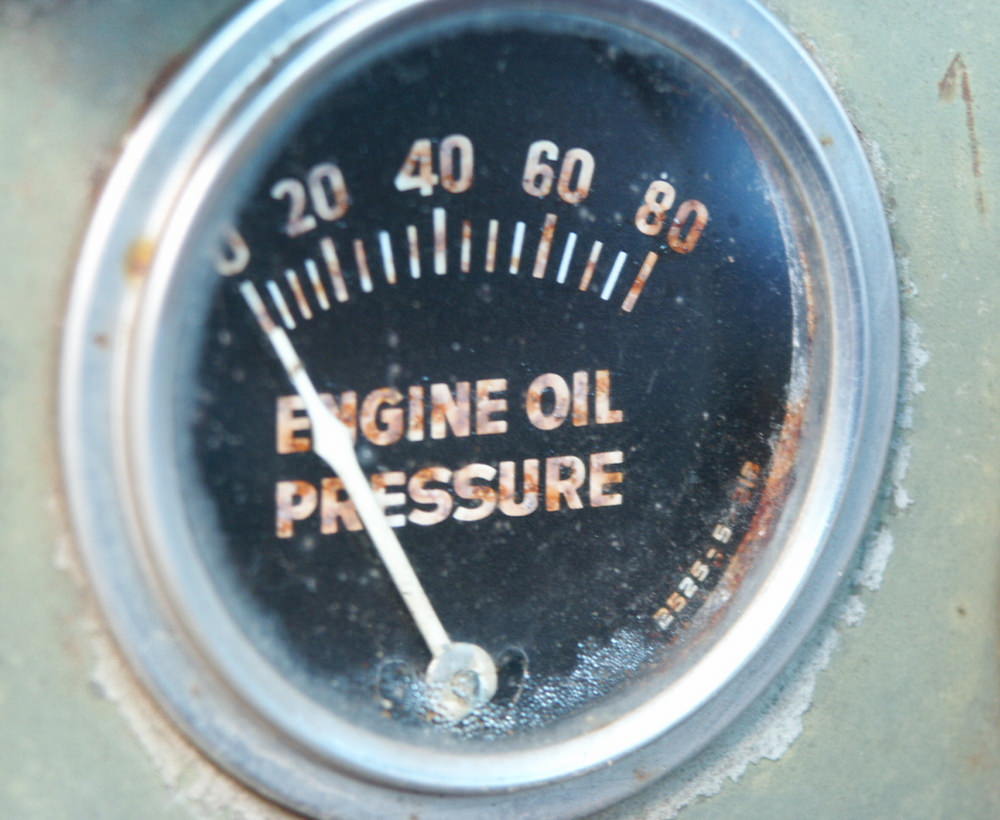

The oil pressure in a vehicle engine plays an important role in making sure that lubricants reach the areas they need to, including the camshaft, main, and balance shaft bearings. This helps reduce the wear of engine parts, ensuring that the engine does not get too hot and continues to run smoothly. When checking the oil pressure gauge, keep in mind that the pressure reads higher in cold weather due to the higher thickness (also known as viscosity) of the oil.
How the oil pressure gauge works
The inner workings of an oil pressure gauge depends in large part on the type: electric or mechanical. A mechanical gauge uses a spring that is affected by the pressure of the oil. A coiled tube, called a bulb, attaches to the oil pressure gauge's outer casing and to linkage at the bottom of the needle. Oil is fed into the bulb under pressure, the same as in the vehicle engine, from a supply pipe that causes the bulb to attempt to straighten. This pressure is what moves the oil pressure needle on your dashboard showing the oil pressure level in the engine.
An electric gauge uses a sending unit and a circuit to send electric signals to the gauge via a wire-wound coil. These parts allow the system to alter the indicator needle to show the correct pressure. The oil enters the end of the sensor and pushes against a diaphragm, which moves a wiper inside the sensor up and down a resistance blade, creating the signal that moves the needle in the gauge.
Some vehicles use an oil warning light instead of an oil pressure gauge. In this case, the warning light connects to a sensor that uses a simple on/off switch that reads the oil pressure through a diaphragm attached to the engine.
Symptoms of a bad oil pressure gauge
When an oil pressure gauge stops working properly, ask a mechanic to make sure it is not faulty. Some common indicators that the oil pressure gauge is not working correctly include:
Oil pressure gauge not working: The causes for this range from a faulty gauge to the need for an oil change. Have a mechanic check the oil level.
Oil pressure gauge reading too low, generally below 15 to 20 PSI while idling. Cold weather can also make the oil pressure read low until the oil pump has had a chance to deliver the oil to the engine.
Oil pressure gauge reading too high, or over 80 PSI while driving, especially at higher RPMs. Vehicle owners can check their manuals for specifics on how high the oil pressure gauge reading should get to when running their engine at certain RPMs.
Other causes of a high or low oil pressure gauge reading
In addition to a bad oil pressure gauge, problems with other systems and parts within the engine can cause a high or low reading. A mechanic will check these problem areas to ensure these parts remain in good working order and are not causing the oil pressure problem.
The oil needs changing: Over time, oil breaks down and loses some of its viscosity, causing a low reading on the oil pressure gauge. The mechanic will check the condition of the oil and change it if necessary.
A blocked oil filter can cause an oil pressure gauge to read high: The mechanic will replace the filter and change the oil in this case.
A blocked oil gallery can also cause a high reading: If this happens, a mechanic flushes the oil system while changing the oil.
Sometimes the wrong grade of oil causes the oil pressure to read high. The mechanic will make sure that your vehicle has the correct grade of oil and change it to the proper grade if necessary.
Worn bearings sometimes cause the oil pressure to show a low reading. The mechanic will change the bearings if needed.
A broken oil pump may cause a low oil pressure reading. In this instance, a mechanic will replace the oil pump.



